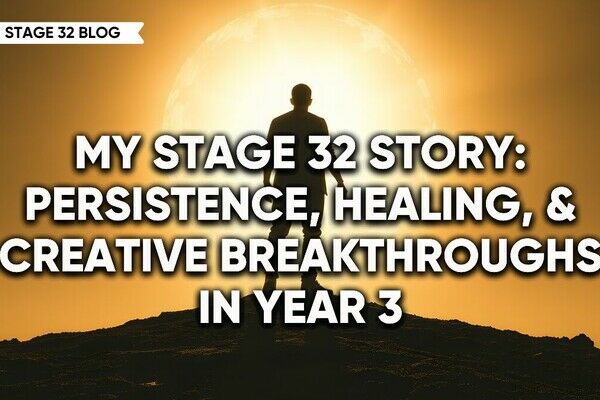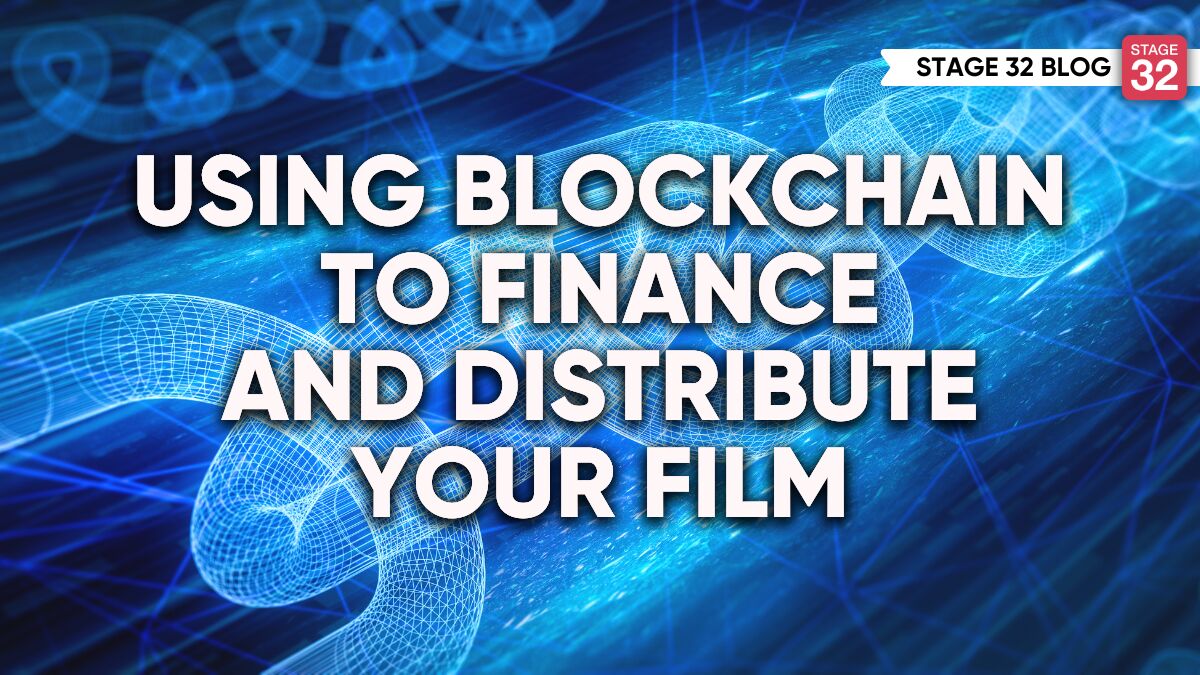Using Blockchain to Finance and Distribute Your Film
The landscape of the film industry is changing and at its forefront is the innovative, Blockchain technology and Web 3.0. In the last decade or so, we have witnessed a major shift in all sectors of film including the studios, streaming companies, and the independent film industry.
Back in 2009, I was teaching at a major university and researching the causes and events of the recent housing financial collapse. It was also around that time; I became aware of Bitcoin and cryptocurrency. Blockchain technology had just been born. Then, in 2019, my attention was once again drawn to the innovative nature of Blockchain and its potential to change and improve industries. Since that revelation, I have studied and researched Blockchain technology intensely with a clear focus directed to the film industry.
I followed a natural progression to focus on how Blockchain technology can improve and create potential major benefits for film funding. Financing film projects often requires an elaborate patchwork of investors, banks, soft money tax credits, and in-kind services. The independent film sector of the industry has been my major focus however, the studios and major streaming companies can and are fully applicable to many of the concepts and protocols discussed.
The independent film industry comprises many elements some of which include development, finance, business affairs, contracts, talent, production, postproduction, music, merchandising, marketing, and distribution, both domestic and international. After having spent over 30 years in the film industry, both at a major studio and as an independent, my extensive and varied experience, has allowed me to fully evaluate how this innovative technology can potentially dramatically change the business environment of the film world.
The bottom line with film financing in this constantly shifting, competitive marketplace is that producers must come up with additional funding in any way possible and Blockchain can be a new innovative film funding potential. Financing a film is inherently risky. Financing a single film is riskier than financing a slate of films. Studios and large streaming companies can finance films much easier than independents. The are many different types of film finance and there are many different sources of film finance.
Blockchain has several inherent benefits. I will focus on the concepts and protocols that are specific to film funding and rely on a certain level of Blockchain 101 knowledge from the reader.
Blockchain technology has the potential to change the landscape of the film business. It brings a new level of empowerment for filmmakers through funding, ownership, and direct connection with fans. As I said earlier, my interest was spiked by Blockchain some three years ago when I began to realize what is happening in the world of changing technology specifically, Blockchain, NFTs, Web 3,0, the Metaverse etc. and I look back in recent history and make some observations that then triggered my in-depth study of this technology.
I began to view certain events that were happening today and compare them to previous major events in my past, and I realized something very special could be happening. Certain trends, observations, and variables were happening in the business and technology world, which included:
- A new and emerging market was being created that 90% of people have real trouble understanding.
- This new market is likely to grow exponentially and inevitably. The underlying technology is so revolutionary that its effects are here to stay and will become very influential.
- This new technology can potentially revolutionize different markets, industries, and the world we live in.
- A market that is and will continue to grow and attract millions of users.
- A market and technology that can change our daily lives.
I immediately looked back on my business experiences and saw:
- 1990’s…….. Internet Was Exactly This Market.
- 2000s …… Social Media Was Exactly This Market
- The iPhone…. Mobile Was Exactly This Market
Blockchain technology has the potential to dramatically change how films are funded. However, as a film producer, it is important to ensure that the “traditional” film funding avenues remain an integral part of financing any film. Blockchain can provide a dramatic new avenue to raise funding based on this new innovative underlying technology.
This new innovative technology provides certain concepts and protocols that potentially open up a pandora’s box of new and exciting avenues of finance.

BLOCKCHAIN & TOKENIZATION
Blockchain technology creates the concept of TOKENIZATION and specifically NFTS and Security Tokens. This is the foundation of a new source of funding, never before utilized by the film industry or any other industry. Tokenization enables the creation of NFTs and security tokens both of which you can use to raise capital for projects including film.
Besides the concept of tokenization, Blockchain also provides other benefits that are potentially significant. These include decentralization, transparency, immutability, smart contracts, and several other revolutionary concepts that can potentially change business practices significantly.
We shall discuss these concepts and how they potentially can dramatically change our understanding of film funding. It is important to understand that the application of this technology and its concepts to the film industry are very new and only time will tell how truly revolutionary they are regarding raising film capital and changing the film industry. As we say, "the jury is still out."
Most people don’t understand Blockchain because they apply typical concepts of computers and internet to the blockchain technology however Blockchain is not either of those concepts.
Blockchain is a Global Peer-To-Peer Transactional Network
"Peer-to-Peer" refers to computer networks in which each computer can function as a server for the others, allowing shared access to files and peripherals without needing a central server.
Blockchain creates ways we can transact directly with each other in a peer-to-peer ecosystem without intermediaries like banks or agents. Digital assets like cryptocurrencies and NFTS will provide new ways to build and distribute wealth in owner-unique economies.
Blockchain
Blockchain is a shared, immutable ledger that enables the process of recording transactions and tracking assets in a secured network.
An asset can be any tangible or intangible (intellectual property, patents, copyrights, branding) item. Assets can be tracked and traded on a blockchain network, minimizing risk, and reducing costs for all involved.
Tokenization
Tokenization is the process of transforming ownership and rights of assets into a digital form. By tokenization, you can transform indivisible assets into token forms. A token represents a tradable asset on a blockchain network. Tokenization in blockchain opens up multiple new possibilities for businesses and individuals.
Tokenization eliminates territorial barriers and intermediaries while enabling fractional ownership of assets, which opens the market to small investors.
With tokenization, digital tokens can be used to represent shares in a company, ownership of real estate, art, or a stake in film investment.
Tokens can then be traded on cryptocurrency exchanges. One of the benefits of tokenization is that it reduces the difficulties of creating, buying, and selling such tokens.
Blockchain technology can create many forms and types of tokens, two of which I have identified for the purpose of our discussion on film financing namely, NFTs (Non-Fungible Tokens) and Security Tokens.
NFTs: The “F” in NFTs does not stand for Film!!
NFTs are digital assets whose ownership is blockchain-based. Their value is based on their uniqueness.
An NFT is different from a typical crypto token because of fungibility. A fungible token can be exchanged for another, whereas a non-fungible token (NFT) cannot be exchanged for another based on its unique nature.
NFTs are non-divisible because they must be bought wholly. For cryptocurrencies like Bitcoin, a fraction of them can be bought. This is not possible with an NFT. The traits create intrinsic value for NFTs because of their limited supply, uniqueness, rarity, and the fact that they are acquired as an entire token.
An NFT is a type of cryptocurrency token that represents a unique asset. Each token is unique; therefore, they are not mutually interchangeable. These tokens represent real-world items, like cars, physical assets, or intellectual film property.
Note: The NFT market is not regulated by any agency.

Security tokens
Security tokens are digital assets representing legal ownership of an asset that can be bought and resold. They are typically distributed to investors through a security token offering (STO). Security tokens could represent a share in a company or an investment in a film project.
The concept of Security Token Offerings (STO) has grown increasingly popular along with the emergence of a vast FinTech market. Security tokens are a relatively new class of assets that aim to be the crypto equivalent of traditional securities like stocks and bonds. Their main use case is to sell shares in a company or project (very much like the shares or fractional shares sold via conventional markets) or other enterprises (for instance, real estate or film) without the need for a broker.
Asset tokenization has gained significant popularity in recent times. It is due to the advantages that a user gets after tokenizing their assets. It enables them to store and trade these tokens fractionally or entirely depending on the requirements and preferences.
Note: Security tokens are classed as securities and are regulated.
Other blockchain technology terms requiring brief definition are:
Cryptocurrency is digital money. Unlike all fiat currencies (government paper money), cryptocurrency does not utilize paper notes. Cryptocurrency is transacted entirely on an encrypted network. Cryptocurrencies utilize Blockchain ledger technology.
Cryptocurrency, digital financial assets, are designed to be bought, sold, and used to purchase assets and services via the internet.
Smart contracts are the business rules, terms, and conditions of a contract/transaction that blockchain technology codes / embeds into the network system. Any agreement or contract in business can be broken down into a series of rules, terms, conditions, and clear stipulations. These rules are laid down within the blockchain as a smart contract.
A smart contract is an application programmed to check, verify, and then carry out a rule-based business process within the blockchain network.
It is a self-executing contract that automatically executes all terms and conditions, therefore eliminating the need for a lawyer or third party to execute. Parties involved in making an agreement can stipulate payment arrangements and who gets what based on predetermined conditions.

MAJOR QUESTIONS
NFTs have already proven to be a significant force in raising capital. Certainly, in the area of merchandising and collectibles NFTs show major promise to acquire funds. But how do NFTs become a major and consistent film funding addition to the traditional financing avenues?
- New film/blockchain ventures are talking about having NFTs as part of a film financing/ownership scenario and participating in a film’s success with revenue/profit sharing.
- An NFT is unique, indivisible, and specific in nature. If a film NFT owner is to share in profits/revenue how is that NFT to be created and to what digital asset is it to be attached that will create that profit-sharing capability?
- Is the NFT to be created as part of the film’s copyright or the completed film or the production company etc. etc.?
- How would the smart contract be written to enable profit sharing in a realistic and viable and legal manner?
- Would creating such an investment type of NFT with profit sharing create major legal and regulatory attention?
Security Tokens. With the expansion of the Fintech finance market and the ability via Blockchain to utilize security tokens a whole new film funding avenue opens up, and as yet, the film industry has now taken full advantage of this marketplace. Yes, it is regulated, and yes, it demands a certain degree of initial investment to set up an offering (STO), but this market has immense potential. The degree of regulation as a security is clear and documented. The level of regulation is significantly less strict than a formal stock offering (IPO) and the Fintech market has become a major area of success in funding for many ventures to acquire capital. With the benefits of Blockchain technology and the availability of the Fintech market will independent film companies utilize the security token approach to raise film funding?
At the moment, all attention appears to be on NFTs and is the glamor finance vehicle but to be a serious player in the NFT market there are certain clear requirements.
- First, a clear understanding on why, how, and what your NFT will be.
- Second, does that NFT have a community large enough to appeal to and garner the required investment? Just to create a film NFT of some type does not guarantee in any way a decent film financial funding compatibility.
- Third, smart contracts have to be written, and in the film industry, such ownership and distribution contracts can be very complicated. Once coded into the Blockchain network they are immutable. Clarity of contents and verification of accuracy are a high priority.
- Four, is any computer network hacker free?
As time passes, Blockchain technology, the crypto markets, and the various platforms will evolve, and the film industry will most certainly participate. The question will be, can they evolve into a viable and significant funding source for film financing needs?

A NEW ERA
The last decade or so has seen a major shift in the film industry. From the evolution of major streaming services like Netflix, studios setting up streaming services, and the advent of fan-based crowd investment.
Certain aspects of the film industry have remained constant: a lack of transparency, a general mistrust, and a high-risk combine to keep many investors out of the billion-dollar film industry.
But now, with Blockchain technology, and the introduction of tokenization, investors who regularly were excluded can potentially participate and feel secure that their investment is less likely to end up in the accounting fog of Hollywood.
The emergence of cryptocurrencies has opened up a new world of opportunities to revolutionize how investments and assets are issued, managed, and transacted. The technology behind the world's first cryptocurrency, blockchain, is one type of distributed ledger technology that has significant potential for multiple means of investment.
Blockchain can enable the financial sector and allow an asset to be easily broken down into smaller units, representing ownership, encouraging the democratization of investment in historically illiquid assets, and bringing about equitable markets.
Over the past several years the terms Blockchain” and Web 3.0 are becoming increasingly popular, both in film and media as well as in many other industries. The potential benefits behind the blockchain and the film industry are yet to be fully exploited, however, there are some industry relative opportunities that stand out namely:
- Transparency
- Liquidity
- Smart contracts
- Accessibility
- Security
- Immutability
- Efficiency
What does all of this mean? How will the blockchain and the new technology behind it impact the film industry as a whole – or will it?
What does this increased transparency mean for the blockchain and the film industry? Would it essentially mean that there will no longer be “Hollywood accounting” or any area for the flow of money to be misinterpreted? Traditionally, the film industry is one in which there is a capital and revenue flowing across many sectors, many entities and across many borders. Keeping track has always been challenging. Transparency and clarity in accounting for this capital/revenue flow has traditionally been questioned.
Transparency
Blockchain technology allows for each and every transaction associated with a film to be registered, permanently and publicly. This ensures honesty among the entire crew and ensures full transparency of financials which is incredibly important to investors, financiers, and others involved in the production.
Additional benefits behind the blockchain and the film industry can be seen in the transparency in decision making too. Keeping records on the blockchain ensures that everyone is aware of the decisions that are made and the outcomes. Where traditional films would be produced based only by industry insiders, blockchain allows for fan-based participation.
Traditionally, funding films involves placing capital prior to production, and that capital will be locked up for a long period. Blockchain can provide increased financing plus increased flexibility. Investors can actually commit as much, or as little, as they wish and have the freedom to adjust amounts as they feel appropriate.
Smart Contracts
These contracts are embedded into the Blockchain network. A record of every transaction and occurrence that occurs throughout the filmmaking process is preserved in the network. There is a reduced need for third-party involvement or attorneys in initiating contracts involved in the production process. Self-executing smart contracts are made between two or more parties and provided the conditions that are outlined in the agreement have been met, contract payments and other stipulations can be fulfilled automatically.
The use of smart contracting as part of the blockchain technology applied to the film industry can mean that fund collection and distribution can be performed more quickly and efficiently than in the traditional industry where ambiguity and delay are common in initiating funding distribution.
Improved Accessibility / Liquidity
Traditionally, the film industry is one of the most difficult to enter for investors. Film has been dominated by the majors and large corporate entities with limited access by the public. Blockchain technology decentralizes exchange processes and can improve the ability of investors to gain access to film funding and can also allow investors and participants to be involved in the greenlight process of films to be made by independent producers.
Rather than a few studios and major companies holding the keys to the industry, instead, blockchain technology can make it possible for films to be funded by the public and participate in the film development and production process.

THE ROAD TO HOLLYWOOD IS PAVED WITH TOKENS
I have attended many film markets including the American Film market in Los Angeles and the Marche at the Cannes Film Festival. With the advent of NFTs and the explosion of NFT activity in various industries, my recent attendance at two of the largest film markets in the last twelve months highlights the interest in film and film funding utilizing blockchain and NFTs. Here are summaries of recent film market activities I have observed:
CANNES 2022
From Blockchain to Web 3.0 and NFTs, there are a lot of new buzzwords out in the marketplace. Can these new technologies make filmmaking more accessible, transparent, and efficient?
In the late 1990s, Cannes was taken over by the dotcoms. A new generation of technology start-ups descended on the Croisette. Banners and billboards promising to revolutionize the film business based on the new technology known as the internet. A year later, those banners were gone. The tech bubble had burst.
For Cannes 2022, replace dotcoms with crypto technology and the internet with the blockchain. Crypto and NFT-sponsored panels, parties, and events are seen everywhere on the Croisette this year
These new tech start-ups with new buzzwords, “NFT,” “metaverse,” “Web 3.0,” and the promise to revolutionize and democratize the film industry, sound very familiar.
Cannes projects advertised include buying an NFT giving you ownership of a limited edition of Sylvester Stallone-created digital artwork or an NFT that gives you exclusive access to Kevin Smith’s upcoming comedy-horror anthology “Kilroy Was Here.”
New venture companies are stating Blockchain and NFT technology can be used to build full digital ecosystems, including decentralized autonomous organizations (DAOs), where all film decisions, including the greenlighting of a film project, or key cast approval, are voted on by the NFT owners, which is then coded into the Blockchain network via digital “smart contracts” without the need for human intervention.
Making the film business - decentralized, democratic, and transparent.
As one of the new venture press announcements stated.
“Web 3.0 — using cryptocurrencies, the blockchain, and smart contracts — can solve a lot of challenges that we face as filmmakers, as financiers, as distributors, and as sales agents. It could change how we fund content, how we release it, how we make it.”
Using NFTs to crowdfund by offering exclusive digital artwork or other crypto assets connected to an indie project could be “substantially more effective” than traditional crowdfunding via sites like Kickstarter. An NFT is a “true asset with real ownership” that gives fans a real stake. Using blockchain technology and smart contracts throughout the production and distribution process could allow companies to easily and transparently trace how funds move in and out of a project, “something the traditional film industry really struggles with.”
A number of the more ambitious Blockchain entertainment ventures go beyond supplementing financing or improving transparency by including a DAO, which will let fans and creators invest in and help greenlight projects while earning Fan Tokens, the digital currency used on the decentralized platform, through their participation.
One must of course caution about these adventurous companies moving in this direction as the area of Federal regulation and complicated legality around film financing does certainly exist.
AFM 2021
In Los Angeles, the AFM (American Film Market) became a hub of NFT buzz. Projects from Kevin Smith, Jennifer Esposito, and Anthony Hopkins are among those looking to the technology of non-fungible tokens as an alternative to the traditional movie business.
The excitement for non-fungible tokens, essentially certificates of authenticity for a digital file, which has already affected the art, gaming, and collectibles industries, has now found a home in the independent film world.
NFTs have already proven themselves in the area of film merchandising. Back in 2018, 20th Century Fox released limited-edition Deadpool 2 digital NFT posters to promote the Ryan Reynolds superhero spoof. The digital work itself can be easily copied and pirated online but the NFT, which is secured via blockchain technology, guarantees the certificate of authenticity, so owners can buy and sell the NFTs like any physical collectible.
NFTs can give fans a way to truly own their experience with their favorite content. As one of the PR people of a new venture company told me. “In a post-physical market, this will become an evolution of a prized DVD collection, a poster of your favorite movie or a ticket stub from a memorable night at the cinema. From a business perspective, this new consumer behavior, powered by blockchain and web 3.0, will open the door to entirely new ways of distributing content, new rights, new windows, and new revenue streams.”
An actual example of this new funding experiment can be found in the film “Zero Contact,” a low-budget thriller starring Anthony Hopkins, shot in 2020 and just released. NFTs were auctioned off, connected to the film, including ones that allowed fans to be digitally edited into the film alongside Hopkins, though only in the NFT version of the movie, not the one planned for wide release.
It seems NFTs were part of the film financing package but far from a significant portion. However, discussions were heard about expanding NFT funding in other ways to increase financing avenues for film investment. Once again, caution was stated that regulations and legal concerns could come into play with any potential financing venture
NOTE: This new world of Blockchain, WEB3.0, tokenization, and NFTs is very much in its infancy in the film industry. Let us not forget that from the ashes of the dot.com collapse rose Netflix betting the internet would revolutionize the entertainment industry.
Are there really changes to the way films are funded?
The reality is many independent films are not produced due to a lack of funding. Blockchain technology can help provide new avenues of funding.
By creating a platform utilizing Blockchain Technology the funding process can become transparent, secure, and verifiable. Blockchain is a shared, unalterable, public ledger for recording transactions, tracking assets, and building trust.
Tokenization is a highly secure method of protecting payment credentials, with the data representing an asset being held in a Blockchain ledger. Smart contracts and digital rights management can be a clear path to the future of financial security.
NFTs represent an opportunity across the film spectrum. First, NFTs can give independent and often small-scale film producers the chance to distribute their content. NFTs enable the filmmaker to distribute the content in the form of NFTs thus controlling the price, the volume on offer, and the content distribution.
Importantly, distributing film in the form of NFTs allows for new, closer relationships between filmmakers and their audiences. Currently, filmmakers will typically produce content for a larger production company to then distribute the content. The production company then controls the customer relationship.
NFTs allow filmmakers to distribute directly to the consumers. In addition, through the NFT metadata, the filmmaker can provide unprecedented access to themselves and the content itself. For example, the NFT that gives access to the film could also give the owner the right to attend seminars with the filmmaker and many other activities.
NFTs can bring benefits to the major players in the film industry. From production companies to cinemas, NFTs can bring a new way for businesses to distribute and interact with the customer regarding film, especially film merchandise. The film studios and production companies will then benefit from the additional revenue stream from future secondary market sales via the NFT metadata.
NFTs can be used to bring greater excitement to the distribution of the content itself. Just like with the smaller filmmakers, NFTs can be used to provide greater access and content to customers who purchase film content as an NFT. Imagine buying access to a film as an NFT and getting access to bonus content, actor meet and greets, or even VIP events. This same concept can be applied to cinema. In the future, Cinema tickets could be bought as an NFT. This would give a customer access to the film but also act as a digital collectible that is owned by the customer. In addition, as mentioned before the NFT could give the cinema-goer further access to content.
Consumers can also benefit from NFTs in film. At the moment, it is expected that when you purchase access to a film either via a subscription service or via a digital library you are only getting access to the content itself. NFTs can bring new levels of content and access to the consumer via the NFT metadata.
Purchasing film content as an NFT can also build a new collectible arena around film. Firstly, via the tokens for the film content and secondly via merchandise. Consumers can display their film collection in their digital wallet, much like showing off a DVD collection in the past. In addition, there will be new digital worlds, games, and collectibles based on films.
Blockchain and NFT technology can bring a new lease of life to film merchandise
There are many ways to pursue film funds (crowdfunding campaigns, private investors, grants, tax incentives, gap financing, negative pickup deals (debt financing), pre-sales, product placement, etc.), however, they all have their own limitations and challenges.
NFTs can offer producers another means of generating funding while securing a built-in fan base who can participate in the production process and potentially earn benefits from the film’s success. While some NFT ownership rights are strictly limited to the digital asset itself, opportunities with film-related NFTs go well beyond this to blend the virtual and real-world aspects of these tokens.
NFTs have been discussed as film investment potential where NFTs are investment vehicles but also share in film profits. Fans of a particular director, storyline, or film genre who invest directly in a film via NFTs can receive the opportunity to reap the financial rewards through the shares of box office and streaming revenues. Investors can purchase an NFT and acquire fractional ownership of film content, whether it be digital artwork or content associated with favorite characters and features important to the storyline, product placement, or of the film rights itself. Under a partial ownership concept, the profit/revenue generated by the film can be distributed in an equitable fashion among the investors.
Beyond the financial rewards, NFTs and the associated contracts offer unique ways for investors to engage the community where they have invested their cash. NFT owners can be given screen time in the film, producer credits, or invitations to exclusive premiers, events, or movie sets attendance with the cast and crew. The opportunities are infinite.
As an unregulated, decentralized technological tool, NFTs allow the buyer and seller the opportunity to determine the terms of the contract. Other sources of funding have rules and regulations that make utilizing them often challenging.
With the potential of film NFTs, producers and directors are empowered to bring their stories and visuals to life. Plus, fans get to participate in the types of movies and storylines that get produced as NFT ownership represents their voice and vote. A new reality dawns.
The new technology can ultimately democratize the filmmaking process and allow more independent productions to get produced, distributed, and exhibited worldwide or in the metaverse.
NFTs of motion pictures have a collectability factor and allow owners to become part of an exclusive community of people who own part of a film. Once the NFT is purchased, fans become film investors with contributing rights, getting a stake in the production process as a reward for supporting it, even before it’s completed. If the film has distribution success, the NFT owners can potentially be able to profit from the increased value of their assets. However, when you buy a film NFT, you do not own the copyright and thereby do not own the rights to distribute it.
For film producers and the creative community, the capabilities enabled by Blockchain technology will pave the way for filmmakers and artists to be paid for their work directly from individuals, removing the requirement for middle layers of production and distribution entities. The digital ledgers created by the immutable computer coding that forms the blockchain will ultimately allow film producers and artists to receive fees tied to any sale of their assets for all time.
The film industry needs to comprehend Blockchain technology and Web 3.0 because it will reflect how the next generation of consumers hope to be entertained and engaged. NFTs, or non-fungible tokens, are digital identifications that are recorded in a blockchain. They certify an owner’s authenticity and rights to specific pieces of digital content such as an image or a video. NFT holders get fan club-like perks that might include wider access, early screenings, and in many cases the right to create their own formulations of the character or asset they own. Such a creative business world is very different from the world that has existed for decades.
The combination of profit share and the possibility of the NFT increasing in value over time have placed these blockchain inventions in high demand but be aware of potential legal and regulatory consequences to such investments.
The ability of Blockchain technology to fundamentally influence the film industry in several ways, specifically in film funding is a real possibility. Only time will tell, but remember what people said about the internet when it was first put forward as an amazing innovative technology, and look where we are now!
Let's hear your thoughts in the comments below!
Got an idea for a post? Or have you collaborated with Stage 32 members to create a project? We'd love to hear about it. Email Emily at emily@stage32.com and let's get your post published!
Please help support your fellow Stage 32ers by sharing this on social. Check out the social media buttons at the top to share on Instagram @stage32 Twitter @stage32 Facebook @stage32 and LinkedIn @stage-32
| The Power of Silence |
| How to Become an Emotionally Resilient Filmmaker |
Search Stage 32 Blog
There are now 4035 blog posts for you to enjoy. Search them all by tags below.
Acting, Advice, Cinematography, Coffee & Content, Composing, Contests, Distribution, Featured, Filmmaking, Financing, Inspirational, Networking, Producing, Screenwriting, Success Stories, Tips, Trending,Relevant Tags
Recommended Articles

November Write Club Week #3: How To Make A Strong First Impression When Meeting Execs, Producers, & Reps

Insider Intel: 2026 Predictions

Insider Intel: Packaging your Project- The Chicken or the Egg Dilemma

Forbes Spotlights Stage 32 Certification!

What Stage 32's Community Is Really About (Beyond Scripts, Sets, and Showreels)

My Stage 32 Story: Persistence, Healing, & Creative Breakthroughs in Year 3

7 Life Hacks For Creatives

Stage 32 Featured at the 43rd Torino Film Festival!

4 Reasons To Have Audio Description On Your Film






